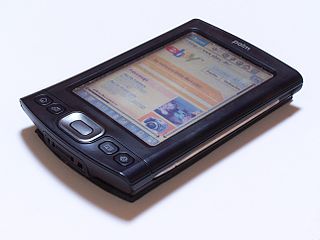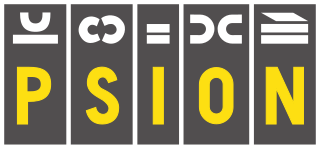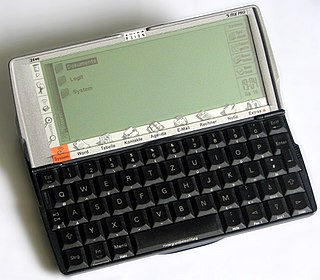
Nokia Corporation is a Finnish multinational telecommunications, information technology, and consumer electronics corporation, originally established as a pulp mill in 1865. Nokia's main headquarters are in Espoo, Finland, in the Helsinki metropolitan area, but the company's actual roots are in the Tampere region of Pirkanmaa. In 2020, Nokia employed approximately 92,000 people across over 100 countries, did business in more than 130 countries, and reported annual revenues of around €23 billion. Nokia is a public limited company listed on the Nasdaq Helsinki and New York Stock Exchange. It was the world's 415th-largest company measured by 2016 revenues, according to the Fortune Global 500, having peaked at 85th place in 2009. It is a component of the Euro Stoxx 50 stock market index.

A personal digital assistant (PDA) is a multi-purpose mobile device which functions as a personal information manager. Following a boom in the 1990's and 2000's, PDA's were mostly displaced by the widespread adoption of more highly capable smartphones, in particular those based on iOS and Android in the late 2000's, and thus saw a rapid decline.
Psion Organiser was the brand name of a range of pocket computers developed by the British company Psion in the 1980s. The Organiser I and Organiser II had a characteristic hard plastic sliding cover protecting a 6×6 keypad instead of a computer keyboard, with letters arranged alphabetically.

Psion PLC was a designer and manufacturer of mobile handheld computers for commercial and industrial uses. The company was headquartered in London, England, with major operations in Mississauga, Ontario, Canada, and other company offices in Europe, the United States, Asia, Latin America, and the Middle East. It was a public company listed on the London Stock Exchange and was once a constituent of the FTSE 100 Index.
Symbian Ltd. was a software development and licensing consortium company, known for the Symbian operating system (OS), for smartphones and some related devices. Its headquarters were in Southwark, London, England, with other offices opened in Cambridge, Sweden, Silicon Valley, Japan, India, China, South Korea, and Australia.

The S60 Platform was a software platform for smartphones that runs on top of the Symbian operating system. It was created by Nokia based on the 'Pearl' user interface from Symbian Ltd. It was introduced at COMDEX in November 2001 and first shipped with the Nokia 7650 smartphone. The platform has since seen 5 updated editions. Series 60 was renamed to S60 in November 2005.
Sony Mobile Communications Inc. was a multinational telecommunications company founded on October 1, 2001, as a joint venture between Sony Corporation and Ericsson. It was originally incorporated as Sony Ericsson Mobile Communications, and headquartered in London, England, until Sony acquired Ericsson's share in the venture on February 16, 2012. On April 1, 2021, Sony integrated its electronics businesses including Sony Mobile into one company called Sony Corporation.

UIQ is a discontinued software platform based upon Symbian OS, created by UIQ Technology AB. It is a graphical user interface layer that provides additional components to the core operating system, to enable the development of feature-rich mobile phones that are open to expanded capabilities through third-party applications.

The Sony Ericsson P900 is a Symbian OS v7.0 based smartphone from Sony Ericsson.

The Psion Series 5 was a personal digital assistant (PDA) from Psion. It came in two main variants, the Series 5 and the Series 5mx (1999), the latter having a faster processor, clearer liquid crystal display (LCD), and updated software. There was also a rare Series 5mx Pro, which differed only in having the operating system (OS) loaded into random-access memory (RAM) and hence upgradeable. Ericsson marketed a version of the Series 5mx renamed as MC218.
Open Programming Language (OPL) is a programming language for embedded systems and mobile devices that run the operating systems EPOC and Symbian. It was released by the British company Psion in 1984.

The Nokia 9210 Communicator is a third-generation Communicator series mobile phone produced by Nokia, announced on 21 November 2000 and released in June 2001. It greatly improved on the second generation Nokia 9110 Communicator, providing a colour main screen and using an ARM processor. It is one of the few mobile phones able to send and receive fax.
David Edwin Potter is the founder and chairman of the microcomputer systems company Psion PLC., and Psion Teklogix after Psion's acquisition of Teklogix in the year 2000.
EKA1 is the first-generation kernel for the operating system Symbian OS. EKA1 originated in the earlier operating system EPOC. It offers preemptive computer multitasking and memory protection, but no real-time computing guarantees, and a single-threaded device driver model. It was largely superseded by EKA2.
Psion Teklogix Inc. was the operational business of Psion.

The Sony Ericsson Satio (U1) is a smartphone, announced by Sony Ericsson at the Mobile World Congress in Barcelona, Spain on 15 February 2009 as the Idou. It was released on 7 October 2009 in the UK in 3 colour schemes: Black, Silver and Bordeaux (Red).

Symbian was a mobile operating system (OS) and computing platform designed for smartphones. It was originally developed as a proprietary software OS for personal digital assistants in 1998 by the Symbian Ltd. consortium. Symbian OS is a descendant of Psion's EPOC, and was released exclusively on ARM processors, although an unreleased x86 port existed. Symbian was used by many major mobile phone brands, like Samsung, Motorola, Sony Ericsson, and above all by Nokia. It was also prevalent in Japan by brands including Fujitsu, Sharp and Mitsubishi. As a pioneer that established the smartphone industry, it was the most popular smartphone OS on a worldwide average until the end of 2010, at a time when smartphones were in limited use, when it was overtaken by iOS and Android. It was notably less popular in North America.
An app store, also called an app marketplace or app catalog, is a type of digital distribution platform for computer software called applications, often in a mobile context. Apps provide a specific set of functions which, by definition, do not include the running of the computer itself. Complex software designed for use on a personal computer, for example, may have a related app designed for use on a mobile device. Today apps are normally designed to run on a specific operating system—such as the contemporary iOS, macOS, Windows, Linux or Android—but in the past mobile carriers had their own portals for apps and related media content.
Galileo was an unreleased 32-bit operating system that was under development by Acorn Computers as a long-term project to produce "an ultra-modern scalable, portable, multi-tasking, multi-threading, object-oriented, microkernel operating system", reportedly significant enough to Acorn's strategy to warrant a statement to the financial markets.
EPOC is a mobile operating system developed by Psion, a British company founded in 1980. It began as a 16-bit operating system (OS) for Psion's own x86-compatible devices, and was later replaced by a 32-bit system for x86 and ARM. Psion licensed the 32-bit system to other hardware makers, such as Ericsson.









